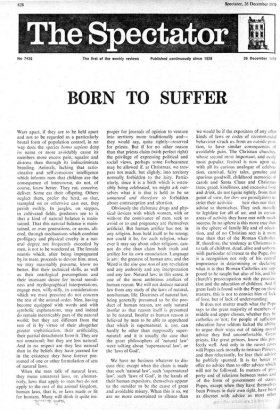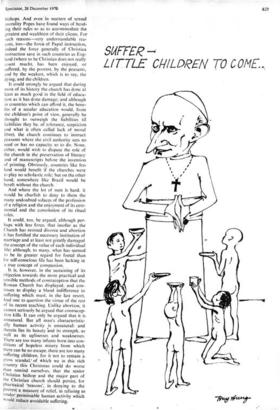BORN TO SUFFER
Wars apart, if they are to be held apart and not to be regarded as a particularly brutal form of population control, in no way does the species homo sapiens deny its name or more avoidably cause its members more excess pain, squalor and distress than through its indiscriminate breeding. Animals, lacking that ratio- cinative and-- self-conscious intelligence which informs men that children are the consequence of intercourse, do not, of course, know better. They rut, conceive, deliver. Some eat their offspring. Others neglect them, prefer the herd, so that, trampled on or otherwise cast out, they perish swiftly. In jungles, on steppes, in cultivated fields, predators see to it that a kind of natural balance is main- tained. That this natural balance is main- tained, or over generations, or aeons, alt- ered, through mechanisms which combine profligacy and physical cruelty in a nat- ural degree not frequently exceeded by men, is not to be wondered at. The female mantis which, after being impregnated by its mate, proceeds to devour him, must, we may reasonably presume, know no better. But their technical skills, as well as their ontological presumptions and their incessant desire for moral seemli- ness and mythographical interpretations, engage men, willy-nilly, in considerations which we must presume do not concern the rest of the animal order. Men, having become equipped with words and with symbolic explanations, may and indeed do remain inextricably part of the natural world; but they are different from the rest of it by virtue of their altogether greater sophistiCation, their artificiality, their partial detachment from it. They are not unnatural; but they are less natural. And in no respect are they less natural than in the beliefs they have yearned for in the existence they have forever pre- sumed of one or other formulation of sets of natural laws.
When the men talk of natural laws, they mean unnatural laws, or, alternat- ively, laws that apply to men but do not apply to the rest of the animal kingdom, human laws, that is, or laws made or fit for humans. Many will think it quite im to* proper for journals of opinion to venture into territory more traditionally and— they would say, quite rightly—reserved for priests. But if for no other reason than that priests claim (with perfect right) the privilege of expressing political and social views, perhaps some forbearance may be allowed. if, at Christmas, we tres- pass not much, but slightly, into territory normally forbidden to the laity. Partic- ularly, since it is a birth which is osten- sibly being celebrated, we might ask our- selves what it is that is held to be so unnatural and therefore so forbidden about contraception and abortion.
Obviously the elaborate drugs and phy- sical devices with which women, with or without the connivance of men, seek to avoid or to end pregnancy are themselves artificial. But human artifice has not, in any religion, been held itself to be wrong; nor could it be, for each religion, what- ever it may say about other religions, can- not do else than claim both truth and artifice for its own enunciation. Language is art t the greatest of human. arts, and the, Wnrd is the sine qua non of any revelatiOn and any authority and any interpretation and any law. Natural law, in this sense, is one of the most ambitious artifices of human reason. We will not deduce natural law from any study of the laws of natural, non-human, life. Doctrines of natural law,- being generally Presumed to be the pro- duct of human reason, are only natural insofar as that reason itself is presumed to be natural. InsOfar as human reason is believed by men to be able to apprehend that which is supernatural, it, too, can hardly be other than supposedly super- natural; and it is usually the case that the great philosophers' of 'natural law' were talking about 'supernatural law', or the 'laws of God'.
We have no business whatever to dis- cuss this; except when the claim is made that such 'natural law', such 'supernatural such 'laws of God', in the hands of their human expositOrs, themselves appear to the outsider to be the cause of great and avoidable misery. When this is so, we are no more constrained to silence than we would be if the expositors of any other kinds of laws or codes of recommended behaviour struck us, from an outside posi- tion, to have similar consequences of avoidable pain. The Christian churches, whose second most important, and easily most popular, festival is now upon us, with all its curious analogue of celebra- tion, carnival, fairy tales, genuine and spurious goodwill, childhood memories of carols and Santa Claus and Christmas trees, greed, kindliness, and excessive food and drink, do not (quite rightly, from their point of view, for they are proselytists) re- strict their aCtivitie heir rites nor their advise to themselves. They seek morally to legislate for all of us; and in certain areas of activity they have met with much success. In no sphere is this more true than in the sphere of family life and of educa- tion, and of no Christian sect is it more true than that of the Roman Catholics. If, therefore, the tendency at Christmas is to talk of children, dead, alive and unborn, with particular reference to the Pope, this is a recognition not only of his central importance in determining or declaring what it that Roman. Catholics are sup- posed to be taught but also of his, and his church's preoccupation with the procrea- tion and the education of children. And if great fault is found with the Pope on these matters, this is not to convict him of lack of love, but of lack of understanding.
It does not matter much what the Pope says to the great majority of members of middle and upper classes, whether they be catholics or 'not; for people of sufficient education have seldom lacked the ability to argue their ways out of taking moral advice they find uncomfortable. Great priests, like great princes, know this per- fectly well. And only in the rarest cases will Popes seek morally to instruct Princes. and then reluctantly, for fear their advice be publicly spurned. It is far better to offer no advice than to offer advice which will not be followed. In matters of pro- perty and of relations between states and of the form of government of states. Popes, except when they' have themselves been Princes in their own right, have been as discreet with advice as most other bishops. And even in matters of sexual morality Popes have found ways of bend- ing their rules so as to accommodate the Greatest and wealthiest of their clients. For such reasons—very understandable rea- sons, too—the force. of Papal instruction, indeed the force generally of Christian instruction save in such countries as Eng- land (where to be Christian does not really count much), has been enjoyed, or suffered, by the poorest, by the peasants, and by the weakest, which is to say, the dying, and the children.
It could strongly be argued that during most of its history the church has done at least as much good in the field of educa- tion as it has done damage; and although in countries which can afford it, the bene- fits of a secular education would, from the children's point of view, generally be thought to outweigh the liabilities (if liabilities they be, of tolerance, scepticism and what is often called lack of moral fibre), the church continues to instruct peasants where the civil authority sees no need or has no capacity so to do. None. either, would wish to dispute the role of the church in the preservation of literacy and of manuscripts before the invention of printing. Obviously, countries like Ire- land would benefit if the churches were to play no scholastic role: but on the other hand, somewhere like Brazil would be bereft without the church.
And where the lot of men is hard, it would be churlish to deny to them the many undoubted solaces of the profession of a religion and the enjoyment of its cere- monial and the consolation of its ritual roles.
It could, too, be argued, although per- haps with less force, that insofar as the Church has resisted divorce and abortion it has fortified the necessary institution of marriage and at least not greatly damaged the concept of the value of each individual life: although. to many. what has seemed to be its greater regard for foetal than for self-conscious life has been lacking in a true concept of compassion.
It. is, however, in the sustaining of its objection towards the more practical and sensible methods of contraception that the Roman Church has displayed. and con- tinues to display a bland indifference to suffering which must, in the last resort, lead one to question the virtue of the rest of its recent teaching. Unlike abortion, it cannot seriously be argued that contracep- tion kills. It can only be argued that it is unnatural. But all man's characteristic- ally human activity is unnatural: and therein lies its beauty and its strength, as well as its uglinesses and weaknesses. There are too many infants born into con- ditions of hopeless misery from which there can be no escape, there are too many suffering children, for it not to remain a gross scandal: of Orhich we in this rich country this Christmas could do worse than remind ourselves, that the senior Christian bishop and the major part of the Christian church should persist, for pharisaical 'reasons', in denying to the poorest a measure of relief, in refusing to render permissable human activity which would reduce avoidable suffering.
SUFFER - LITTLE CHILDREN TO CONE..
-rote flevf-","



















































 Previous page
Previous page